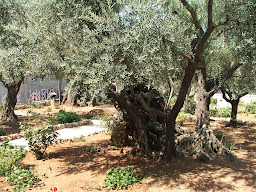Mark 14:43-50
And immediately, while he was still speaking, Judas came, one of the twelve, and with him a crowd with swords and clubs, from the chief priests and the scribes and the elders. Now the betrayer had given them a sign, saying, “The one I will kiss is the man. Seize him and lead him away under guard.” |
| Gethsemane today |
And Jesus said to them, “Have you come out as against a robber, with swords and clubs to capture me? Day after day I was with you in the temple teaching, and you did not seize me. But let the Scriptures be fulfilled.”
And they all left him and fled.
Comments:
Judas showed up in the garden with a mob, and they were armed for trouble. We don't see it here in Mark, but I love the extra details recorded in John that show how the men were all knocked down by Jesus merely saying, "I am He"...the Prince of Peace proclaiming his divinity.
v.45 As soon as He had come, immediately he went up to Him and said to Him, "Rabbi, Rabbi!" and kissed Him. (NKJV)
"Rabbi, Rabbi!" reminds me of those who in the last days will cry out "Lord, Lord!" but Jesus will say that he never knew them. Judas had done great things for Jesus, he had along with the rest of the apostles been given the power to cast out demons, heal the sick, and even raise the dead. He had been privileged to preach the good news that the Anointed One (lit. Messiah) was in their midst. He had listened to Jesus' teaching & preaching, commanding & comforting, loving & leading—yet Judas chose to betray the Lord into the hands of the religious leaders for the meager price of a slave.
Peter so far had not denied the Lord and stepped forward in sleep-induced "delirium" and tried to kill someone. He succeeded only in cutting off a servant’s ear. Jesus quickly remedied the situation (Luke 22:51) and healed the man's ear. He made the point that if they had wanted to arrest him they could have done it while he was in the temple every day teaching. He did not surrender to them because of force (See John 18:3-8) but in order to fulfill the Scriptures. He was in complete submission to the will of the Father.
One of the things I think we can learn from Judas is that duplicitous behavior toward others is forever to be characterized as the sin of Judas. When we lie, betray, and pretend friendship with others but only to stab them in the back we betray Christ all over again. Do we really love our neighbors as ourselves (Matt. 9:19; 22:39)? Does our love rise to that of Jesus’ command, “that you love one another as I have loved you”?
Or Paul’s instruction to the church in Rome, “Let love be genuine. Abhor what is evil; hold fast to what is good.” (Romans 12:9)










